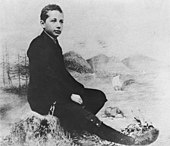
Albert Einstein ; 14 March 1879 – 18 April 1955) was a German-born theoretical physicist. He developed the general theory of relativity, one of the two pillars of modern physics (alongside quantum mechanics).:274 Einstein's work is also known for its influence on the philosophy of science. Einstein is best known in popular culture for his mass–energy equivalence formula E = mc2 (which has been dubbed "the world's most famous equation"). He received the 1921 Nobel Prize in Physics for his "services to theoretical physics", in particular his discovery of the law of the photoelectric effect, a pivotal step in the evolution of quantum theory.
Near the beginning of his career, Einstein thought that Newtonian mechanics was no longer enough to reconcile the laws of classical mechanics with the laws of the electromagnetic field. This led to the development of his special theory of relativity. He realized, however, that the principle of relativity could also be extended to gravitational fields, and with his subsequent theory of gravitation in 1916, he published a paper on general relativity. He continued to deal with problems of statistical mechanics and quantum theory, which led to his explanations of particle theory and the motion of molecules. He also investigated the thermal properties of light which laid the foundation of the photon theory of light. In 1917, Einstein applied the general theory of relativity to model the large-scale structure of the universe.

He was visiting the United States when Adolf Hitler came to power in 1933 and, being Jewish, did not go back to Germany, where he had been a professor at the Berlin Academy of Sciences. He settled in the U.S., becoming an American citizen in 1940. On the eve of World War II, he endorsed a letter to President Franklin D. Roosevelt alerting him to the potential development of "extremely powerful bombs of a new type" and recommending that the U.S. begin similar research. This eventually led to what would become the Manhattan Project. Einstein supported defending the Allied forces, but largely denounced the idea of using the newly discovered nuclear fission as a weapon. Later, with the British philosopher Bertrand Russell, Einstein signed the Russell–Einstein Manifesto, which highlighted the danger of nuclear weapons. Einstein was affiliated with the Institute for Advanced Study in Princeton, New Jersey, until his death in 1955.
Einstein published more than 300 scientific papers along with over 150 non-scientific works.On 5 December 2014, universities and archives announced the release of Einstein's papers, comprising more than 30,000 unique documents. Einstein's intellectual achievements and originality have made the word "Einstein" synonymous with "genius".[ Albert Einstein was born in Ulm, in the Kingdom of Württemberg in the German Empire on 14 March 1879. His parents were Hermann Einstein, a salesman and engineer, and Pauline Koch. In 1880, the family moved to Munich, where his father and his uncle founded Elektrotechnische Fabrik J. Einstein & Cie, a company that manufactured electrical equipment based on direct current.
The Einsteins were non-observant Ashkenazi Jews. Albert attended a Catholic elementary school from the age of 5 for three years. At the age of 8, he was transferred to the Luitpold Gymnasium (now known as the Albert Einstein Gymnasium), where he received advanced primary and secondary school education until he left Germany seven years later.

In 1894, his father's company failed: direct current (DC) lost the War of Currents to alternating current (AC). In search of business, the Einstein family moved to Italy, first to Milan and then, a few months later, to Pavia. When the family moved to Pavia, Einstein stayed in Munich to finish his studies at the Luitpold Gymnasium. His father intended for him to pursue electrical engineering, but Einstein clashed with authorities and resented the school's regimen and teaching method. He later wrote that the spirit of learning and creative thought were lost in strict rote learning. At the end of December 1894, he travelled to Italy to join his family in Pavia, convincing the school to let him go by using a doctor's note. It was during his time in Italy that he wrote a short essay with the title "On the Investigation of the State of the Ether in a Magnetic Field.
In 1895, at the age of 16, Einstein sat the entrance examinations for the Swiss Federal Polytechnic in Zürich (later the Eidgenössische Technische Hochschule ETH). He failed to reach the required standard in the general part of the examination,but obtained exceptional grades in physics and mathematics. On the advice of the principal of the Polytechnic, he attended the Argovian cantonal school (gymnasium) in Aarau, Switzerland, in 1895–96 to complete his secondary schooling. While lodging with the family of Professor Jost Winteler, he fell in love with Winteler's daughter, Marie. (Albert's sister Maja later married Wintelers' son Paul.) In January 1896, with his father's approval, he renounced his citizenship in the German Kingdom of Württemberg to avoid military service. In September 1896, he passed the Swiss Matura with mostly good grades, including a top grade of 6 in physics and mathematical subjects, on a scale of 1–6. Though only 17, he enrolled in the four-year mathematics and physics teaching diploma program at the Zürich Polytechnic. Marie Winteler moved to Olsberg, Switzerland for a teaching post.
Einstein's future wife, Mileva Marić, also enrolled at the Polytechnic that same year. She was the only woman among the six students in the mathematics and physics section of the teaching diploma course. Over the next few years, Einstein and Marić's friendship developed into romance, and they read books together on extra-curricular physics in which Einstein was taking an increasing interest. In 1900, Einstein was awarded the Zürich Polytechnic teaching diploma, but Marić failed the examination with a poor grade in the mathematics component, theory of functions. There have been claims that Marić collaborated with Einstein on his celebrated 1905 papers,but historians of physics who have studied the issue find no evidence that she made any substantive contribution.
No comments:
Post a Comment